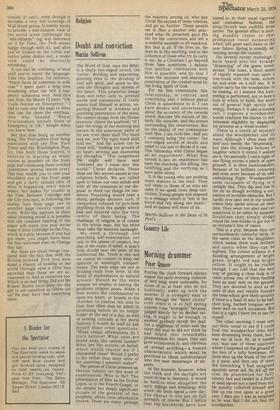Religion
Doubt and conviction
Martin Sullivan
The Word of God, says the Bible, is a sharp two-edged sword, the 'cutter,' dividing and separating, piercing even to the dividing of soul and spirit, and quick to discern the thoughts and intents of the heart. This powerful. image does not refer only to printed words and statements. It really means God Himself in action, imparting Himself in intimate and searching penetration of the mind. We cannot escape from the Divine presence, claims the psalmist; "If I take the wings of the morning and remain in the uttermost parts of the sea, even there shall Thy hand lead me, and Thy right hand shall hold me." And the action can be closer still, "seeking the ground of my heart, proving and examining my thoughts." 'Tor judgement [He might well have said 'criticism] am I come into this world," Christ declared. These ideas are like arrows aimed at our religious beliefs. We are called upon to know our own minds and with all the resources at our disposal, to think out things for ourselves. Preaching would take a sharp, perhaps decisive turn, if clergymen refused to proclaim anything from the pulpit which had not entered into the very centre of their being. The challenge of religion is of course to the whole man, but his mind must take the heaviest onslaught.
We need a thorough and searching self-examination, not only in the sphere of conduct, but also in the realm of belief. A man's faith should bear the print of his intellectual life. Truth is one and we cannot be content to keep our opinions in watertight compartments. The keen edge we use in dividing truth from error, in the fields of mathematics or natural science, Should be the same weapon we employ in solving the problems religion poses. When a man enters the confessional to open his heart, or kneels in his chamber to confess his sins to God, how often does he admit to professing beliefs he no longer holds? At the end of a day, as well as looking critically at my moral failures, I would do well to ask myself some other questions. "What credal affirmations do I truly believe? What ones are stored away like useless lumber? What are the articles of belief, which would shatter me if I abondoned them? Would I prefer to die rather than deny some of the assertions I solemnly make?"
The person of Christ presents an obvious subject tor this kind of' examination. Who is He? The peesentation of Him as the Divine Logos, as in the Fourth Gospel, or the simpler but deeply significant picture of the greatest of the prophets, offers clear alternative choices. There are many, perhaps the majority among us, who pay Christ the second of these tributes, and go no further. These people see in Him a teacher who practised what He preached, gave His life for His convictions and left a wonderful example to all mankind. But that is all. If He lives on, He does so in His teaching, and in the influence of those who try to carry it out. As a Christian I go beyond those bare assertions. I believe. that spiritual communion with Him is possible, and by that I mean the intimate and searching penetration of the created mind by the living Spirit of God.
For me this communion, this relationship, is central, and everything else I believe about Christ is subordinate to it. I can have doubts and uncertainties about the accuracy of the records which describe the nature of His birth, His miracles, and the events surrounding His resurrection. But on the reality of my communion with Him, I am rock-like. And yet I contantly bring 'the cutter,' the two-edged sword of doubt and belief to cut and to divide if it can. This fellowship with Christ began as an experiment. What has turned it into an experience has been the checking, the sifting, the falsifying and the verifying as I have gone along. It is the young who are pushing these matters to the limit. They will listen to those of us who are older if we speak from deep conviction. Young people will respond to a message which is "felt in the blood and felt along the heart." And so indeed will most of us.
Martin Sullivan is the Dean of St Paul's.


































 Previous page
Previous page